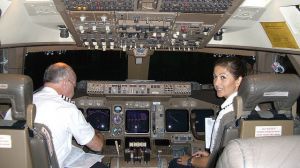
British Airways pilots prepare for takeoff at Seattle SeaTac airport, Novermber 23, 2007. (Image: Flickr/ Esther Dyson)
Social class isn’t just about how hefty a person’s paycheck is. Where you live, your occupation, how educated you are and how you present yourself to the public are among the cues people use to determine your social status.
We may consider airline pilots to be esteemed, highly skilled professionals, but in the fastest growing sector of the industry — regional airlines — starting pay is as low as $22,400 per year, or $10.75 per hour, according to the Airlines Pilots Association. They make as much as a fry chef at a fast-food joint, but, culturally speaking, they still belong to the middle class.
With a sluggish economy, growing inequality and dwindling union clout, millions of people who work traditionally middle class jobs have joined the working poor. They still enjoy the same perceived social status, but their incomes aren’t sufficient to live a middle class lifestyle.
Nowhere is that trend more pronounced than in higher education. Today, around three-quarters of all US college professors are classified as “contingent faculty” — those who aren’t on a tenure track — and about half are technically “part-time,” even though many of them teach a full-time load of classes. They may be highly educated professionals, but most adjuncts struggle to make ends meet with low pay, limited benefits and zero job security.
In Thursday’s New York Times, Brittany Bronson, an adjunct English instructor at the University of Nevada, Las Vegas, wrote about her double life teaching the humanities by day and slinging hash at a local chain restaurant by night:
On the first day of the fall semester, I left campus from an afternoon of teaching anxious college freshmen and headed to my second job, serving at a chain restaurant off Las Vegas Boulevard. The switch from my professional attire to a white dress shirt, black apron and tie reflected the separation I attempt to maintain between my two jobs. Naturally, sitting at the first table in my section was one of my new students, dining with her parents.
This scene is a cliché of the struggling teacher, and it surfaces repeatedly in pop culture — think of Walter White in “Breaking Bad,” washing the wheels of a student’s sports car after a full day teaching high school chemistry. Bumping into a student at the gym can be awkward, but exposing the reality that I, with my master’s degree, not only have another job, but must have one, risks destroying the facade of success I present to my students as one of their university mentors.
In class I emphasize the value of a degree as a means to avoid the sort of jobs that I myself go to when those hours in the classroom are over. A colleague in my department labeled these jobs (food and beverage, retail and customer service — the only legal work in abundance in Las Vegas) as “survival jobs.” He tells our students they need to learn that survival work will not grant them the economic security of white-collar careers. I never told him that I myself had such a job, that I needed our meeting to end within the next 10 minutes or I’d be late to a seven-hour shift serving drunk, needy tourists, worsening my premature back problem while getting hit on repeatedly.
There’s much more to the story; read the rest at The New York Times.


